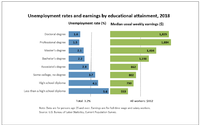Top Reasons Why a College Degree is a Valuable Asset
December 18, 2019 3:38pm
If you’ve been thinking about completing your degree, you’ve probably been examining many of the same topics that cross the minds of other adult students, including: Will it all be worth it? While there are many common benefits to obtaining your degree – job qualification, career advancement, and overall personal goals – there are also a few additional surprising benefits to consider.
College creates networking opportunities
Attending college classes, whether traditionally or online, will put you in direct contact with a variety of classmates, instructors, administrators, and college staff members. Those interactions can not only lead to study partnerships and friendships that will benefit you as you progress through school, but can also lead to connections after graduation that may bolster your career. Some of those contacts may even secure you a job before graduation!
College promotes personal development
Besides the degree itself, the college experience leads to the development of a variety of personal skills. First, college teaches you to think! You’ll likely be required to take courses for your major that you wouldn’t have chosen on your own. You’ll be exposed to a diverse group of peers and instructors as you examine subject matter that may challenge and surprise you. You’ll graduate a more thoughtful, well-rounded individual! College will also teach you time management, especially if you are in an accelerated online degree program. Navigating how to balance a job you already have along with coursework and other social and family obligations takes some work to establish. But it’s a skill that will be invaluable as you enter your career. Another thing you’ll learn is how to overcome adversity. You’ll be faced with tests on the same day, conflicts between projects and your work schedule, and difficulty grasping certain subject matter for starters. Learning how to overcome these challenges will be an added skill you can put to good use later. It will also improve your self-confidence!
College degrees yield higher earnings and job stability
Do you want to ensure you’ll make more money during your lifetime? Statistics show the sure way to do that is by earning a college degree. According to the U.S. Bureau of Labor Statistics, those with bachelor’s degrees reported a median weekly salary of more than $450 more than those with a high school education in 2018. Their findings also show unemployment rates being 2% lower that year for those with bachelor degrees compared to those with a high school diploma. And those numbers look even better for those possessing graduate degrees.
And when you look at the numbers in the long run, they are even more eye opening. Another report in 2018 touts the average college graduate will earn $900,000 more in their working lifetime than someone with a high school diploma. That same report also points out various factors weigh in on how much you’ll make with you degree, including your major, college of choice, and pure luck. It highlights business and STEM majors as being among the best when it comes to financial payoff.
Degrees lead to job opportunities with high quality benefits
Those with college degrees are more likely to have career opportunities at companies and organizations where they will not only earn more, but receive more in benefits! These may include but are not limited to the following:
• Paid sick
• Paid vacation
• Paid maternity/paternity leave
• Better/cheaper healthcare coverage
• Higher employer retirement contributions
• Tuition reimbursement
Plus, depending on the industry in which you work, there could be added perks that come with your job!
College graduates tend to be healthier
Being educated and holding a job with good benefits has proven to lead to healthier lifestyles. Studies show that college graduates are more likely to exercise and less likely to smoke. According to College Board, in 2014 smoking rates were just 4% among college graduates compared to 26% in high school graduates. And 69% of graduates with at least a bachelor’s degree aged between 25 and 34 years old reported engaging in vigorous exercise at least once a week. Compare that to 45% of those with high school diplomas reporting the same amount of exercise. College Board also reports college graduates also vote, volunteer, and engage in their communities more frequently.
You might also like these blog posts:
Signs it’s Time to Finish Your College Degree
How to Earn Your Degree Faster
Are Accelerated Online Courses Right for Me?



